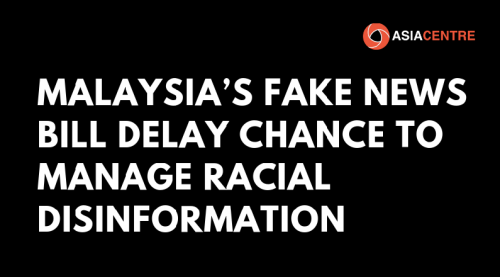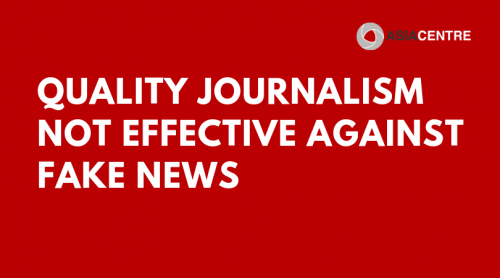
In December 2023, Asia Centre published the report Digital Security & Human Rights Defenders: Recommendations for NHRIs in the Asia-Pacific in partnership with the Asia Pacific Forum. The report’s findings show that the proliferation of the internet and digital tools among human rights defenders (HRDs) has opened up new avenues for their advocacy, providing enhanced communication and mobilisation capabilities. However, this technological progress has also given rise to the enactment and application of laws by governments that hinder the efforts of HRDs, encroaching upon their digital rights. In response to these developments, the report’s key recommendation calls upon National Human Rights Institutions (NHRIs) to play a proactive role in addressing complaints and providing support to HRDs.
In 2018, the Global Alliance of National Human Rights Institutions (GANHRI) hosted a conference bringing together various NHRIs, resulting in the formulation of the Marrakech Declaration. This Declaration laid out a comprehensive framework of action for NHRIs to safeguard the rights of HRDs and bolster their endeavours. Building upon the principles of the Declaration, NHRIs affiliated with the Asia Pacific Forum for NHRIs (APF) adopted the Regional Action Plan on Human Rights Defenders 2021-2025, further solidifying their commitment to supporting HRDs.
Since then, several activities and interventions have been implemented to advance the cause of promoting and protecting HRDs within the framework of this Action Plan. Such efforts include advocacy for comprehensive national legal protections for HRDs and engagement with governmental and non-governmental organisations to promote the rights of HRDs. Nevertheless, the Action Plan falls short of encouraging NHRIs to undertake comprehensive measures against government legal and non-legal actions that infringe on HRDs’ legitimate use of digital technology to advocate for human rights.
These government actions manifest through online content regulation laws and non-legislative measures, including infrastructural control over internet access, digital surveillance, and information operations. Such actions have been a cause for concern among civil society, as these actions curtail HRDs’ rights to use technology and, instead, constrain their freedom of expression, freedom of assembly, and right to privacy in the course of their work.
The inability to effectively address these concerns stems from institutional constraints within NHRIs, hindering the implementation of policies outlined in the Regional Action Plan. Broadly, NHRIs lack a comprehensive understanding of digital rights and the digital security threats faced by HRDs, preventing them from taking proactive measures to prevent these threats, particularly those that are extra-legal and covert. This leads to institutional limitations in three crucial areas.
Specifically, NHRIs do not have an effective early warning system, thereby restricting their monitoring and reporting capabilities. This inadequacy encompasses the absence of HRD focal points, rapid response teams, and emergency communication channels. Furthermore, the efforts to systematise the recording and reporting of HRDs’ rights violations are hampered, ultimately limiting institutions’ understanding of the overall impact on HRDs.
Additionally, the advocacy and public awareness-raising initiatives of NHRIs are also curtailed due to the aforementioned weaknesses in monitoring and reporting capabilities, as there is not enough data or evidence upon which to base their advocacy. In fact, less than half of NHRIs in the Asia-Pacific region actively engage in advocacy on issues related to digital rights and digital security threats. Where there is some limited advocacy, it often lacks substantiation due to the absence of concrete evidence. Notably, almost all NHRIs refrain from addressing such concerns publicly through their communication channels.
Moreover, while the Action Plan delineates capacity-building and network-building as key goals – leading to NHRIs convening meetings, stakeholder discussions and international conferences on digital rights – there is a notable absence of a clear strategy for sustained engagement. The majority of activities and collaborations appear to be one-off, lacking a cohesive, long-term plan. In addition, despite commendable efforts, including international cooperation initiatives by GANHRI and the NHRI Digital Rights Alliance, there remains a need for more structured and enduring efforts to formalise cross-institutional engagement.
Recognising these constraints, NHRIs should proactively boost their institutional capacity in line with the Regional Action Plan. Specifically, they should concentrate on grasping the interplay between HRDs, digitalisation, and rights infringements in their monitoring and reporting efforts. This focused strategy will bolster more impactful and sustained endeavours in tackling the challenges outlined in the Action Plan.
NHRIs should also advocate on HRDs’ behalf. For instance, they can participate in international human rights platforms (such as Universal Periodic Reviews), provide information and legal analysis to parliamentary committees and closely work with tech companies as a key stakeholder. A clear communications plan should be adopted to ensure public awareness of the matter.
Engagement should be undertaken with civil society in the region to increase ways of connecting and collaborating with HRDs. At the same time, NHRIs should get together to form a regional-level coalition to share information and build capacity.
Digital rights are becoming more and more significant given the increased usage of the internet, social media and messaging applications. However, at the same time, digital security threats continue to be ever-present and are interfering with the work of HRDs. As such, NHRIs must be empowered to adapt to this digital age, developing specific, contextual strategies to help HRDs mitigate these threats.
Asia Centre is a civil society research institute in Special Consultative Status with the United Nations Economic and Social Council (UN ECOSOC). It serves as a knowledge partner, undertaking evidence-based research as well as providing capacity-building training for civil society actors.
If you would like to collaborate with the Centre, please send an expression of interest to contact@asiacentre.org.



